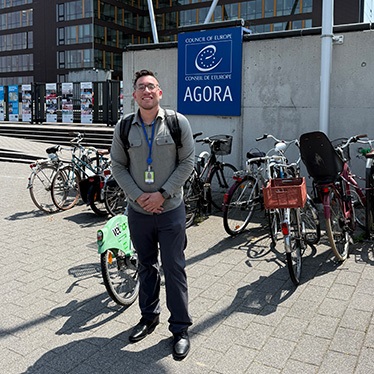RIDGE Partnership Grant Supports Maternity Health Research
July 12, 2023
Associate Professor Sarah Hamersma and graduate student Mitch McFarlane will use the $75,000 grant to investigate the impacts of SNAP food assistance on maternal and infant health.
Sarah Hamersma, associate professor of public administration and international affairs, and graduate student Mitch McFarlane, have received a $75,000 grant from Tufts University to support their examination of the impacts of food assistance on maternal and infant health.
The funding spans from June 1 to Nov. 30, 2024, and supports their work to research health outcomes for pregnant women receiving food assistance from the Supplemental Nutrition Assistance Program (SNAP) before pregnancy. Consistent access to healthy food is key to a healthy pregnancy for mother and child; Hamersma and McFarlane hope to learn more about how SNAP access prior to pregnancy could benefit low-income pregnant women’s health and their children’s health after birth.
“Our findings will contribute to the evidence base on the benefits of SNAP and will also provide insights into whether SNAP access is a useful vehicle pre-conception for women to improve both their own and their children’s outcomes,” says Hamersma.
The RIDGE Partnership, which stands for Research Innovation and Development Grants in Economics, supports research on federal nutrition assistance programs. For the 2023 application cycle, the U.S. Department of Agriculture awarded the partnership to Tufts University, the University of Connecticut, and the University of Missouri, and these institutions are responsible for administering grants to researchers.
Hamersma and McFarlane are using this research to extend their knowledge on the effects of food assistance on mothers and children.
“While it is well-established that SNAP during pregnancy is beneficial to outcomes like child health and birth weight, there is a growing body of evidence that the health and nutritional status of women before pregnancy is already a significant risk factor for pregnancy health for themselves and their children,” says Hamersma, adding, “Since preconception health is so vital, it makes sense to explore policies that can make an impact on this important period as a precursor to improvements in maternal and infant health.”
McFarlane is a public administration Ph.D. student. He is researching anti-poverty programs and public health impacts with Hamersma. He previously worked as a budget and policy analyst for the Medicaid program in Wisconsin.
Hamersma is a senior research associate in the Center for Policy Research (CPR) based at Maxwell. Her work focuses on the impact of health and nutrition programs on food security and health outcomes.
Previously, Hamersma has received funding from the United States Department of Agriculture through the University of Kentucky Center for Poverty Research for research on breaking intergenerational transmission of food insecurity through higher education access. She has also investigated food assistance and educational decisions of young adults; that research was funded by the Cornell Population Center and Syracuse University’s Center for Aging and Policy Studies as well as the W.T. Grant Foundation.
Hamersma received a Ph.D. from the University of Wisconsin–Madison in 2004.
By Sophia Moore
Published in the Fall 2023 issue of the Maxwell Perspective
Related News
School News

Dec 4, 2025
Commentary

Dec 2, 2025
School News

Nov 25, 2025

